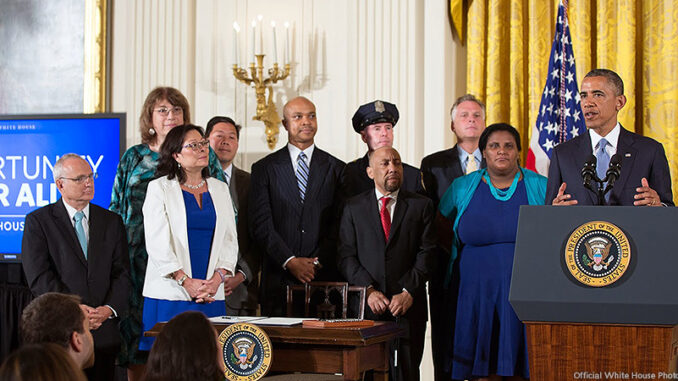
New California Vaccination Bill

Earlier this year, btw brought you news about an outbreak of measles at Disneyland. Shortly after that incident, Senator Richard Pan and Ben Allen introduced legislature in California that would require more parents to vaccinate their children. The bill would eliminate the current exemption for “personal belief.” (The percentage of people using this exemption has risen from less than 1 percent in 2000 to 2.5 percent in 2014.) Under the new law, the consequence for refusing to vaccinate would be having to educate children at home. The debate has drawn a large number of protestors who say that the action violates their rights.
To become a law, the bill must gain the approval of several committees in both the Senate and the State Assembly. One of the biggest obstacles for lawmakers it its current stage is the potentially large number of schoolchildren shut out of the public education system. One of the proposed amendments of the bill is an expansion of the definition of homeschooling to provide more options, like independent study programs supported by the public school system.
What Do You Think? Do some research into the continued journey of this bill through the California legislature. How likely do you think it is to become a law? Support your answer with two resources.
Continued Unrest in Yemen
Yemen is a small country in the Middle East, but it is important because of its strategic location along the Arabian peninsula. Two groups are fighting for control of the country (the waterway called the Bab Al Mamdab, through which most of the world’s oil passes, in particular). On one side are those who support the current president Abdurabuh Mansur Hadi. On the other are the Houthis, a militant Shia rebel group from the north who formed an alliance with ousted former president Ali Abudullah Salah. Hadi is supported by much of the international community. The Houthis, however, control much of the military. Last fall, they took control of the capital city Sana’a and have recently taken siege of the costal town of Aden.
Many political commentators consider the fight within Yemen to be a “proxy war.” This means that there are larger forces at play. In this case, it is the ongoing rivalry between Iran and Saudi Arabia. Iran is ruled by the Shia party, who back the Houthis. Saudi Arabia is ruled the Sunnis, who support Hadi. A third group, Al-Qaeda in the Arabian Peninsula (AQAP), complicate the conflict by fighting with both groups for control of the country.
Dig Deeper Do some research and determine likely impacts of the situation in Yemen on the rest fo the world.
President Obama Speaks Out Against Conversion Therapy
A petition created by the Transgender Human Rights Institute on Change.org (an online petition tool) gained considerable attention when it was posted to the “We the People” section of Whitehouse.gov. It called for a ban on the practice of conversion therapy on LGBT minors. (The acronym LGBT stands for Lesbians, Gays, Bisexuals, and Trans-sexuals.) To qualify for an official response from the government, a petition must receive 100,000 signatures within 30 days. More than 330,000 signed in support of what is being Leelah’s Law.
Leehlah Alcorn was a transgendered girl from Ohio. She committed suicide last year after her parents had pulled her from school and forced her to participate in conversion therapy. This form of therapy is designed to change a homosexual orientation to heterosexual. Some of its reconditioning techniques can include nausea-inducing drugs or electric shock. In response to the petition, President Obama called the practice unethical and has been proven to cause great harm. He said that what happens to a person after they come out depends, not only on his circle of family and friends, but on, “the kind of society we engender.”
Dig Deeper California, New Jersey, and Washington, D.C. already have laws that ban the use of conversion therapy on minors. Eighteen other states have introduced similar legislation. Do some research and find out how these laws are similar and how they differ.
Decoding Slang
One of the few things that each new generation seems to have in common is its desire to dismiss what has come before and make things new for themselves. This certainly includes language, slang in particular. The folks over at NPR recently did a piece exploring the history of our most colorful slang terms, reaching back to the 1870s. In response, btw takes a look at popular contemporary American slang beginning in the 1980s:
- Words that essentially mean “great” or “cool” – Da bomb, fly, phat, sweet, tight.
- Shortening of words – cray (crazy), rents (parents), jelly (jealous), tots (long o–as in totally), adorbs (adorable), dis (disrespect), peeps (people), bro (brother).
- Phrases – Talk to the hand (I’m not listening), Take a chill pill (relax), You go, Girl (I support you), Who’s your Daddy? (Who’s stronger and more powerful than you?).
- Verbal communication in a digital age – Hashtag (used for emphasis at the end of a sentence), Blowing up (one’s phone, feed, etc. from overuse), YOLO (You Only Live Once). SOOF (Swear On Our Friendship).
